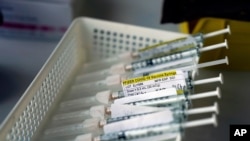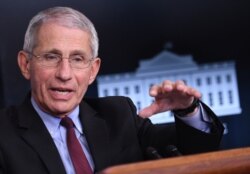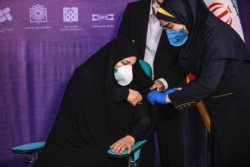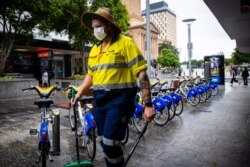President-elect Joe Biden’s transition team said Friday that the incoming administration would more quickly release coronavirus vaccines once it assumed power on January 20.
Biden’s office said it would limit the Trump administration’s practice of increasing inventories of vaccine doses to guarantee that people get the booster shot several weeks after the first inoculation.
Expectations were high when the vaccines were approved last month, but the vaccination campaign has gotten off to a sluggish start. The U.S. Centers for Disease Control and Prevention said that 6.7 million first doses of COVID-19 vaccines had been administered in the country as of Friday morning, out of 22 million doses distributed.
Infectious-disease expert Anthony Fauci told National Public Radio in an interview Thursday that he believed “things will get worse as we get into January.” This is a result, he said, of “the holiday season travel and the congregate settings that usually take place socially during that period of time.”
Fauci said he was hopeful that when Biden was in office, the U.S. would be able to deliver to the U.S. public “1 million vaccinations per day, as the president-elect has mentioned.”
Health professionals and other scientists are concerned that Wednesday’s assault on the U.S. Capitol may have been a COVID-19 superspreader event.
The shouting rioters who invaded the building were largely unmasked and not observing social distancing as they went through the halls of Congress and entered some lawmakers’ offices.
Anne Rimoin, an epidemiologist at the University of California-Los Angeles, told The New York Times that “people yelling and screaming, chanting, exerting themselves — all of those things provide opportunity for the virus to spread, and this virus takes those opportunities.”
The U.S. topped 4,000 coronavirus deaths in a single day for the first time, according to the John Hopkins Coronavirus Resource Center. The tally showed the nation had 4,085 deaths Thursday, along with nearly 275,000 new cases of the virus.
Daily mark
The Washington Post reported Friday that the U.S. had passed another record with more than 300,000 new daily coronavirus infections Friday.
The U.S. has more COVID-19 cases than anyplace else in the world – 21.8 million of the globe’s more than 88 million infections.
The U.S. has also suffered more COVID-19 deaths than any other country – more than 368,000 of the world’s nearly 2 million COVID-19 deaths.
The head of the World Health Organization, Tedros Adhanom Ghebreyesus, Friday urged the manufacturers of COVID-19 vaccines and the wealthier countries to make them available to poorer countries. He said of the 42 countries that were rolling out coronavirus vaccines, most were high-income nations and a few were middle-income countries.
Iran’s supreme leader, Ayatollah Ali Khamenei, has banned imports of COVID-19 vaccines from America’s Pfizer-BioNTech and Britain’s AstraZeneca, citing a mistrust of Western countries.
“I really do not trust them,” Khamenei said Friday in a televised speech. “Sometimes they seek to try out their vaccines on other nations to see if it works or not. I am not optimistic [about] France, either.”
Khamenei said he continued to allow the import of vaccines from other "safe" places and still supported his country’s efforts to produce its own vaccine.
Iran began human trials with its vaccines in December and hopes they will be available in the country this spring.
Saudi king vaccinated
In Saudi Arabia, the country’s 82-year-old monarch, King Salman, received the coronavirus vaccination, according to video published Friday by state media. Saudi health officials recorded just 97 new cases of the virus on Friday and four deaths as infections in the country continued to decline.
Britain announced mandatory COVID-19 tests Thursday for all international arrivals to the country.
Brazil surpassed 200,000 deaths from COVID-19 on Thursday, making it the country with the second-highest death toll in the world.
The Australian city of Brisbane began a three-day lockdown Friday night after a member of a hotel’s quarantine cleaning staff was found to have the highly contagious British mutation of the coronavirus.
"Doing three days now could avoid doing 30 days in the future," Queensland Premier Annastacia Palaszczuk said Friday morning when she announced the move.
The Sydney Morning Herald reported that authorities were tracing the woman’s movements around the city. She was reported to be the first local person to have contracted the virus variant that has been reported in several people in hotel quarantine.
Johns Hopkins said Australia had more than 28,500 COVID-19 cases.









